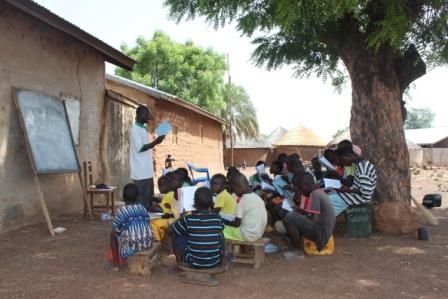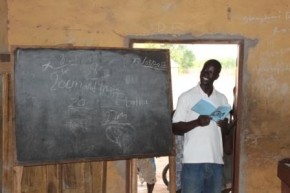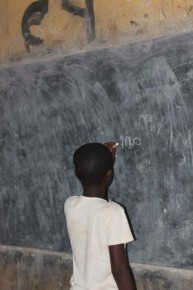Hi, I'm Henry - I arrived in Ghana to work for DFID a few months ago. In my blog I want to share ideas about the country, what we do here, and what life is like for Ghanaians. 2012 is a crucial year for Ghana - the economy is growing rapidly, oil revenues are starting to come into the country, and there's a general election in December. But, as much of the country changes rapidly, some people are getting left behind. This first post is about one of our projects I went to visit last week:
Karim grasped the chalk firmly in her hand and carefully traced out the letters of a word on the blackboard. She is the first female in her family ever to be able to do this – the first to stay in school, the first to learn how to read and write.
A goat strayed underneath the tree where Karim and her classmates sat, and nibbled idly at a stool. Sitting outside with the distractions of the village going past might not be the ideal environment, but it's better than not going to school at all.

Originally, like her elder sisters, Karim had been forced to leave primary school to help her mother at home. In the less-developed north of Ghana this is not uncommon.
Karim's second chance at learning comes from 'School for Life' - a programme DFID Ghana supports which targets children aged 8-14 in rural communities in northern Ghana who have dropped out of primary school. It works with these communities to find a local facilitator to teach, and finds a time for classes that allows the children to help out at home, as well as go to school.
Outside; under a tree; in an unoccupied school classroom – classes take places wherever they can. Children get taught intensively in their native tongue for nine months, and can then re-join primary school. The programme has helped thousands of children since it started 17 years ago.

Each 'School for Life' class is overseen by a local committee, normally consisting of three women and two men from the village.
They decide the format of the classes, nominate a teacher from within their community, and visit a family if their child stops coming to class.
A School for Life programme manager translated for me as Baba, the Vice-Chairman of Karim's school committee, explained:

"Even the blind and the dumb know that education is important. This place from here to Tamale (northern Ghana’s main city) was all farms. New buildings have choked most of the land – people won't even get land to farm… If you don't go to school, the land you used to farm, or your father's, or your grandfather's is no longer yours. You can't count the importance of education."
For many, the nature of life in northern Ghana is changing. Baba and most of his committee had not gone to school, but they realise what a difference that made, and what these changes might mean. He continued, "Our age group, who went school, they still look young compared to us because of the nature of our work."
Hopefully for children like Karim, it won't be the same.

9 comments
Comment by Dr. David Peat posted on
How do the teachers receive knowledge about how to teach? I applaud the efforts --- they do a great deal of good. I am a professor of educational pedagogy, literacy, etc. Are there opportunities with DFID to work with the community-based instructors? Is this what you do?
Comment by Henry Donati posted on
Thanks for your comment David. The facilitators recieve training before they start teaching, and then more training after their first 3 months. Some of them then go on to do formal teacher training and join the mainstream school system, whilst most of those running School For Life were previously teachers themselves, so there are close links between the programme and the formal school system.
They make special efforts to recruit female facilitators because the evidence shows that parents are far more likely to send their daughters to school if they are taught by women.
Take a look at School for Life's Website http://www.schoolforlifegh.org/
Comment by Charlotte Borger posted on
Hello Henry - I sondered if you knew about Kuapa Kokoo? Back in 1998 DFID guaranteed a loan to help Kuapa Kokoo - a cooperative of cocoa farmers - set up their own chocolate company - Divine Chocolate. It was a visionary decision - delivering a long term trade alternative to aid, and still one of the leading examples of successful alternative business models bringing together Africa and UK (NB they also own third of Divine Chocolate in USA).
As an organisation Kuapa Kokoo has also been dynamic and innovative in their approach to child labour awareness, education, and healthcare.
Let me know if you'd like to know more.
Comment by Henry Donati posted on
Hi Charlotte,
thanks for your comment - I hadn't heard of Kuapa Kokoo before, but it sounds like an interesting and successful project. DFID Ghana isn't working directly with cocoa farmers now, but is focusing more on the less developed north of Ghana (where they don't grow cocoa). We are developing a programme to stimulate growth in the private sector, that should help small scale farmers.
Comment by Rachel Kasumba posted on
Henry, it is great to learn that these children get a chance to pursue primary education. How are they integrated into the secondary school system once they complete their primary education? Thanks
Comment by Esther posted on
Hello Henry,
Your blog indeed has some useful information on 'School for Life'. Who, by the way, implemented the 'School for Life' programme for DfID?
Would you say the programme has been successful?
Comment by Henry Donati posted on
Hi Rachel and Esther - thanks for your comments. The children rejoin primary school after they have finished their 9 months in school for life, and then can progress to secondary school in the normal way.
School for Life is the NGO which implements the programme. It has been very successful, and DFID Ghana is increasing our support for it.
You might be interested in this video which shows some of the programmes DFID has supported recently - it shows lots of footage from School for Life classes which I filmed.
http://youtu.be/gB6hb92l8vo
Comment by rafiq posted on
Hi Henry, it is great to learn that these children get a chance to attend formal schooling.then tell me is there any activity from sfl in secondary and heigher education?
Comment by Henry Donati posted on
Thanks for your comment Rafiq. School for Life focuses only on primary school children - for children who have never been to school, learning to read and write has to be the first step.
You're right that there is also a big problem in Ghana with children dropping out of secondary school, particularly girls. DFID Ghana is supporting another NGO - CAMFED - which provides scholarships to help keep girls in secondary education - read about it on my colleague Nicole's blog here - http://dfid.blog.gov.uk/2012/10/what-does-education-mean-to-girls-in-ghana/
Keeping students in higher education is also important too, but it's not an area DFID works on here in Ghana.